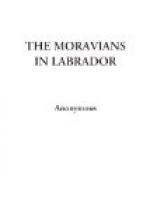In the course of the winter, nine persons came to reside at the settlement, professing to enquire for rest to their souls; the missionaries gladly received them, and directed their attention to our Saviour’s invitation to the weary and heavy laden. Among them an Esquimaux woman came from Saeglak, and requested leave to reside at the station; the missionaries informed her that she was welcome to do so, but that she must give up all heathenish practices. She replied that for some time past, both her husband and herself had discontinued these things, and had been long thinking about their conversion, and therefore they had come to them. About a week after, the husband himself came, and confirmed what his wife had said. On the 12th of July three boats’ companies arrived from the north, and several of the Esquimaux paid the brethren a visit, but seemed little disposed to listen to the gospel. Only one young man remained with his mother. Many Esquimaux arrived in the following year [1832] for the sake of trade; but when the brethren advised them to make the salvation of their soul their chief concern, they all began to offer excuses, yet on being spoken to about the consequences of death, they did not, as formerly, treat it with levity; some even appeared thoughtful after such conversations, and five persons removed from the heathen to the settlement. Of those who had resided with them for some time, they had the pleasure, on Easter Sunday, to baptize four adults and one child, being the first accession to the church at Hebron from among the heathen. The number of their congregation in August, the date of their latest accounts, amounted in all, to 162 persons, of whom 72 had joined from Okkak, and 10 from Nain.




